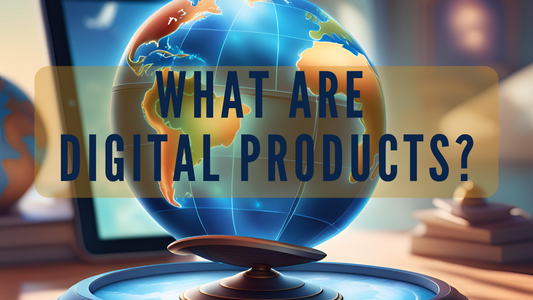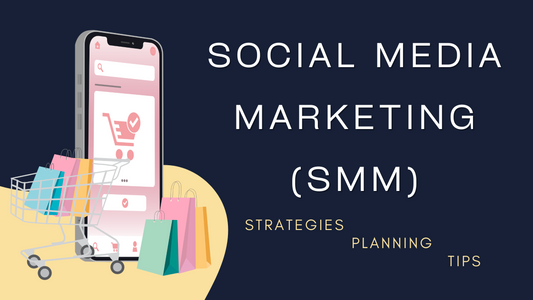A Comprehensive Guide to Understanding and Leveraging Digital Marketing for Your Business
In today's fast-paced, technology-driven world, digital marketing has become an essential tool for businesses aiming to thrive in the competitive online marketplace. Whether you're running a small startup or managing a large corporation, understanding digital marketing and its various strategies is critical to building a strong brand presence and reaching your target audience effectively.
In this blog post, we'll dive into what digital marketing is, its benefits, how it works, and why it has become a cornerstone of modern business strategies. We'll also explore how businesses can use digital marketing to increase online visibility, encourage engagement, and ultimately grow their customer base.
What is Digital Marketing?
Digital marketing refers to the use of digital channels and technologies to promote and advertise products or services to a targeted audience. Unlike traditional marketing methods that rely on physical mediums like print ads and billboards, digital marketing leverages the internet, social media platforms, search engines, email, mobile apps, and more to connect with potential customers.
In simple terms, digital marketing is the umbrella term that encompasses all marketing efforts that use an electronic device or the internet. It includes a range of strategies such as:
- Search Engine Optimization (SEO): Optimizing your website content to rank higher in search engine results.
- Content Marketing: Creating and sharing valuable, entertaining, informative, and educational content (e.g., blog posts, videos, infographics) to attract and engage customers.
- Social Media Marketing: Using platforms like TikTok, Facebook, Instagram, LinkedIn, and Twitter to promote your brand and interact with users.
- Email Marketing: Sending targeted emails to nurture relationships with prospects and customers.
- Pay-Per-Click Advertising (PPC): Paying for ad placements on search engines or social media platforms.
- Affiliate Marketing: Partnering with third-party marketers to promote your products or services.
- Influencer Marketing: Collaborating with influencers to increase brand visibility.
Digital marketing spans various tactics, and the key to success is choosing the right mix of strategies that align with your business goals.
Benefits of Digital Marketing
Digital marketing offers numerous advantages that traditional marketing methods simply cannot match. Let's explore some of the key benefits:
1. Wider Reach and Global Audience
One of the most significant advantages of digital marketing is the ability to reach a global audience. Unlike traditional marketing, which may be limited to a specific geographic area, digital marketing allows businesses to connect with potential customers from all over the world, 24/7.
2. Cost-Effectiveness
Digital marketing campaigns can be much more affordable than traditional marketing methods. For example, running a paid search campaign through Google Ads or creating content for social media requires far less investment than printing physical ads or running a TV commercial.
3. Real-Time Analytics and Data
With digital marketing, businesses can track the performance of their campaigns in real-time. Tools like Google Analytics, Facebook Insights, and email marketing platforms provide valuable data on website traffic, user behavior, conversion rates, and more, allowing businesses to make data-driven decisions and adjust their strategies instantly.
4. Targeted Marketing
One of the key advantages of digital marketing is the ability to target specific demographics with pinpoint precision. You can segment your audience based on factors such as age, gender, location, interests, and online behavior. This targeted approach leads to higher engagement and more effective marketing efforts.
5. Increased Engagement and Interaction
Digital marketing enables businesses to engage with their customers directly, whether through social media comments, email responses, or live chat. This level of interaction fosters a deeper connection with your audience and helps build brand loyalty.
6. Higher ROI (Return on Investment)
Because digital marketing is cost-effective and measurable, businesses often see a higher return on investment compared to traditional marketing. With optimized campaigns, businesses can increase their sales, drive more website traffic, and convert leads into loyal customers.
7. Personalization
Digital marketing allows businesses to tailor their messaging to individual customers. Whether it's through personalized email offers, product recommendations based on browsing history, or dynamic ads, the ability to customize your marketing efforts improves customer experience and boosts conversion rates.
How Digital Marketing Works
Digital marketing works through a combination of various strategies, channels, and tools to attract, engage, and convert potential customers. Here's a brief overview of how it works:
1. Attracting Visitors
The first step in digital marketing is attracting potential customers to your website or social media pages. This can be achieved through SEO, paid ads, content marketing, social media posts, and other tactics that drive traffic to your site.
2. Engaging the Audience
Once visitors arrive on your website or social media, the next step is to engage them with compelling content, relevant offers, and seamless user experiences. This could involve using high-quality blog posts, interactive social media posts, or engaging video content.
3. Converting Leads
Once you've captured the attention of your audience, the next step is to convert them into leads or customers. This is typically achieved through tactics such as lead magnets (eBooks, webinars, free trials), email marketing, or well-designed landing pages with clear calls-to-action (CTAs).
4. Nurturing Relationships
After conversion, digital marketing continues to nurture relationships through ongoing communication and personalized offers. This helps build customer loyalty and turns one-time buyers into repeat customers.
5. Optimizing and Scaling
Digital marketing is an iterative process. Marketers constantly monitor their campaigns, gather data, and make adjustments to optimize performance. Whether it's tweaking ad copy, refining SEO strategies, or testing new content formats, continuous optimization helps scale successful campaigns.
Why is Digital Marketing So Popular Today?
The popularity of digital marketing has exploded in recent years due to several factors:
- Increased Internet Usage: With billions of people worldwide using the internet daily, businesses have more opportunities to connect with their target audience online than ever before.
- Mobile Devices: The rise of smartphones and tablets has made it even easier for businesses to reach customers on the go through mobile-friendly websites and apps.
- Social Media Growth: Social media platforms like Facebook, Instagram, TikTok, and LinkedIn have become essential channels for businesses to engage with customers and promote their products or services.
- Shifting Consumer Behavior: Today's consumers are more tech-savvy and prefer researching products, reading reviews, and making purchases online rather than relying on traditional retail methods.
- Cost and Accessibility: Digital marketing is more affordable and accessible to businesses of all sizes. Small businesses, startups, and even individuals can use online tools to build an effective marketing strategy on a budget.
Conclusion: Here's Why Digital Marketing is a Must for Businesses
In a world where online presence is crucial for success, digital marketing offers unparalleled opportunities to reach, engage, and convert your target audience. From increased visibility to higher ROI, digital marketing empowers businesses to grow their brand, expand their customer base, and stay competitive in an ever-evolving marketplace.
As technology continues to advance, digital marketing will remain an essential part of any business strategy. Whether you're just starting or looking to refine your existing efforts, mastering the art of digital marketing is key to long-term success in today's digital-first world.







